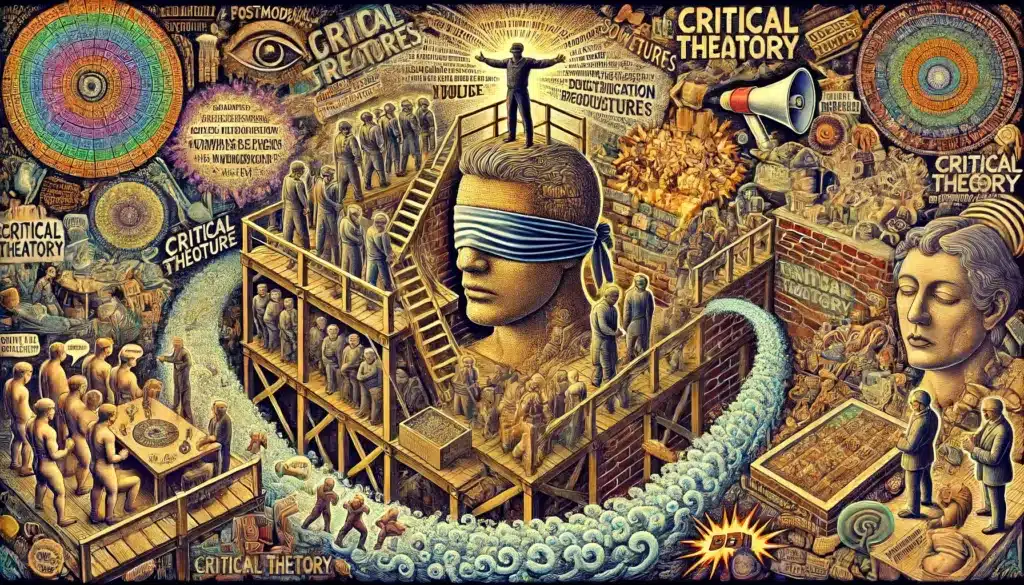The Postmodern Roots of Critical Theory and Wokeism
Deconstructing Wokeness
Few phenomena have sparked as much debate and division in the labyrinthine corridors of contemporary social discourse as the emergence of Critical Theory and Wokeism (aka Social Justice Movements). These ideologies, increasingly influential in academia, politics, and popular culture, are often associated with the fight against social injustice and inequality. However, to truly understand their origins and motivations, one must delve into the philosophical underpinnings of postmodernism, particularly the concepts of deconstruction and language control. Postmodernism, an intellectual movement that emerged in the mid-20th century, challenged modernism’s fundamental assumptions, emphasising rationality, objectivity, and progress. Postmodern thinkers, such as Jacques Derrida, Michel Foucault, and Jean-François Lyotard, sought to deconstruct the grand narratives of the past and question the very nature of truth, knowledge, and power. This article explores how these postmodern ideas have shaped and influenced the development of Critical Theory and Wokeism, ultimately serving as the framework behind these ideologies.
The Postmodern Turn
Postmodernism emerged as a philosophical movement in the mid-20th century. It challenged modernism’s core assumptions, emphasising rationality, objectivity, and progress. Key postmodern thinkers like Jacques Derrida, Michel Foucault, and Jean-François Lyotard sought to deconstruct the grand narratives of the past and question the nature of truth, knowledge, and power. Postmodernism introduced a critical lens through which to examine the established norms and values that had long been accepted without question.
Deconstruction and Language Control
At the heart of postmodernism lies the concept of deconstruction, a method of critical analysis that seeks to expose the inherent contradictions and ambiguities in language and thought. By breaking down the binary oppositions that structure our understanding of the world, deconstructionists aim to reveal the hidden power dynamics and ideological assumptions that underpin our discourse.
Language control, another key aspect of postmodernism, refers to the idea that language is not a neutral medium of communication but rather a tool of power that shapes and constrains our perceptions of reality. By analysing how language is used to construct and reinforce certain narratives, postmodern thinkers sought to challenge the dominant discourses and empower marginalised voices. (See Postmodern Epistemology)
The Emergence of Critical Theory
Critical Theory, rooted in the Frankfurt School of the early 20th century, is a Marxist-inspired approach to social analysis that seeks to uncover the underlying structures of power and domination in society. Drawing on the insights of postmodernism, particularly the ideas of deconstruction and language control, Critical Theorists developed a framework for understanding and critiquing how power is exercised through cultural and ideological means.

The Influence of Postmodernism on Critical Theory
Postmodernism’s emphasis on deconstruction and language control gave Critical Theorists powerful tools for analysing society’s power dynamics. By applying these methods to studying culture, media, and ideology, Critical Theorists uncovered how dominant narratives maintained the status quo and perpetuated inequality. This intersection of postmodernism and Critical Theory facilitated a deeper understanding of power and oppression in contemporary societies.
The Rise of Wokeism
Wokeism, aka social justice activism, can be seen as an extension of Critical Theory‘s project of challenging dominant discourses and empowering marginalised voices. Drawing on the insights of postmodernism, particularly the ideas of deconstruction and language control, Wokeism seeks to expose and dismantle the systems of power and oppression that shape our society. This movement aims to raise awareness of social injustices and advocate for the rights and recognition of marginalised groups.
Postmodern Roots of Critical Theory and Wokeism
The influence of postmodernism, particularly the concepts of deconstruction and language control, can be seen as a driving force behind the emergence of Critical Theory and Wokeism. These ideologies have shaped contemporary social justice and inequality discourse by challenging our society’s fundamental assumptions and empowering marginalised voices. However, as with any powerful idea, the application of postmodernism in the context of Critical Theory and Wokeism has not been without controversy, and it remains a subject of ongoing debate and discussion.
Understanding the connections between postmodernism, Critical Theory, and the Social Justice Movements is essential for navigating the complexities of modern social and political discourse. Recognising the power of language and the diversity of perspectives can help foster a society that values diversity, promotes equity, and strives for social justice.


